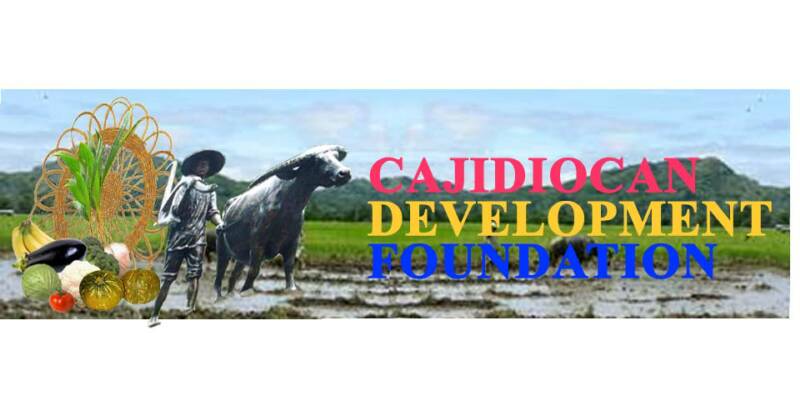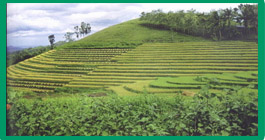
HOME
ABOUT US
SERVICES
CONTACT US
CAJIDIOCAN DEVELOPMENT
FOUNDATION

COMMUNITY DEVELOPMENT PROCESS
Rolando V. Nolasco, DVM, MPA, MA
The insurmountable barrier that prevents the efficient delivery of these services to families that live in upland/rain fed areas is evidenced by the progressive decline in production brought about by the continued degradation of farmlands. As a result, hunger and poverty is still prevalent in these areas. The factors that contribute to this state are the following: slash-and-burn farming method (kaingin system), rapid depletion of forest cover by illegal logging activities and extraction for fuel consumption, and the absence of soil conservation techniques that will ensure sustainability of farming. Very obvious even among lowland farmers is the dependence on commercial inorganic fertilizers and chemicals which remains to be the costliest input to production. More often than not, farmers apply only the minimal amounts because of its prohibitive cost. Not only will these inputs greatly influence the economic viability of farmlands, but as well affect the ecosystem with many beneficial organisms taken out of the farming equation. Our present cropping system has become detrimental to the environment that we even see some changes in our climate. We seem to have ignored the benefits of birds, bees, earthworms and many others that sustained our farms for generations by polluting, if not, decimate their environment. Very obvious is that mudfish and catfish which were abundant in the past seem to have disappeared in our rice fields.
Poverty and hunger remains to be an important concern. Just recently, Australia's Dept. of Foreign Affairs and Trade said in a report that the "Philippines lags behind countries in poverty reduction due to lack of sustained growth over the past 30 years." (Philstar, Wednesday 7/25/07) This is supported by the claim of newly elected Congressman Salvador Escudero III, my former boss with the Bureau of Animal Industry and ultimately with the Dept. of Agriculture, regarding decentralization or devolution (transfer of power or authority) from the national government to local government units. Services like agricultural extension, forest management, health services, baranggay roads and social services were turned over to local government units in compliance to Local Government Code of 1991. He contends that that local government does not have the ability to run a unified program on food production and sustain effective health delivery system. First of all, local governments do not have highly technical staff to run the program. Second, Internal Revenue Allotment (IRA) amounting to 40% of the taxes collected by the national government is not sufficient to operate quality medical facilities. As matter of fact, how many of the medical staff has left the country for a much better paying job; even medical practitioners have left to apply as nurse overseas. If indeed these medical facilities run by local government units are at par with privately operated centers, why do governors or mayors ever opt to have procedures done in regional centers, if not in Manila? I was shown an annual report of a Municipal Agricultural Officer that shows lack if tangible efforts to really boost food production in the area. It was simply a compilation of figures that meant nothing. I really doubt if it corresponds to the development plan, if ever they have. Dr. Escudero III laments that soon the country will be short of basic food commodities and the blame will be on the national government.
In the last presidential election, we witnessed a high ranking official of the Dept. of Agriculture, dispensed millions of government money to boost food production. The program was meant to buy fertilizer for distribution to the poor rice farmers. It turned out that the money was channeled to congressmen and eventually to local elected leaders since it was election time. More than a coincidence, the program was named after the incumbent president who was also a presidential candidate, just as the Dept. of Health gave out insurance cards for people to have access to medical care. In short, inappropriate fertilizers were purchased at exorbitant prices and worst scenario, the goal was not achieved and nothing has happened with the investigation. Even congressional inquiry on this case seems to have died down since the extradition of the said high ranking official from the United States. Yesterday, I read from one of the dailies about the Japanese government set to give fertilizers to farmers. I just hope and pray that only the legitimate farmers receive this much needed input for them to survive this difficult time. It just dawned on me when a barge carrying 200 heads of cattle for dispersal arrive in Iloilo and I was charged to receive these animals for distribution to twenty municipalities. Prior to the arrival of the shipment, I went to local officials asking for recipient farmers to prepare the necessary documents. The mayor of the coastal town where these animals were unloaded demanded that all the 200 heads should be dispersed to his town alone; as a mater of fact many of his people came not knowing what to do with the animals. I told him that these were already allotted to municipalities and are expecting the delivery. He made phone calls to my superiors asking that I be removed from the service or transferred, I told him in the presence of his thugs that I was not afraid to lose my job for I could find better paying job in the private sector with my qualification. I have worked with the government for almost twenty years coordinating with elected local executives about some programs/projects my agency would like to implement. I expected some degree of interest and enthusiasm for it will benefit their constituents but the common response is: "What is there for me?"
It lends to the issue raised by this Australian agency the claim for lack of sustained effort in running any development programs on the part of our government. These development programs seem to be a campaign not to eradicate hunger and poverty but a ploy to will redound to the benefit of politicians. The sad statement from IFAD/ICRAF Final Document: Program for Developing Mechanisms to Reward Asian Upland Poor for Environmental Service They Provide is this: "The benefits of national and local investments in economic development initiatives and/or their products are often irrelevant or inaccessible to the upland communities. Being far away and disconnected from administrative and economic power centers means that political, social, economic and ecological niches occupied by them are not central to national development concerns or priorities. Hence their development needs and aspirations are often not on the "map" of the decision makers and rank very low in the hierarchy of national priorities." A case in point is our experience with the mining ventures allowed by government to do damage to our virgin forest reserve and environment where this same government declared our island to be protected Natural National Park.
This is a very accurate description of the state of many projects seemingly designated to enhance the lives of those who have less in life. While many of our national and local leaders claim to have successful implementation of projects, the sad fact remains that hunger, poverty and lack of opportunity for many still remains if not worse. There is no reason for us to be working against one another because there is a great challenge ahead of us. I am truly grateful for this opportunity to be of help to our less fortunate kasimanwas and so I invite those who have succeeded in life to join this campaign to help others achieve their dreams.
I had the opportunity to work with the late Gov. Evilio Javier in his pilot project: Antique Upland Development Project funded by Ford Foundation and the World Bank financed pilot project: Rainfed Agricultural Development (Iloilo Project); served also as Technical Trainer for US Peace Corps for five years. Should you have question or inquiry, kindly send your email to: olmdeacon @yahoo.com. I would gladly respond to them. The accompanying picture is model upland farm called Sloping Agricultural Land Technology (SALT for short) designed to conserve soil erosion, terraces like formation will likewise allow to catch and hold rain water efficiently and promote farm diversity to provide year round produce for the farm families.
The Agricultural Outlook:
There is no denying that the agricultural sector is a vital component of any development process in Third World countries. Its contribution to food security, providing income for farm families and stabilizing the local economy of are reasons for government's effort to provide services that would encourage increased food production. The many so-called rural or countryside projects funded by government and the various international development oriented agencies like electrification and irrigation projects, farm-to-market roads, and establishing post-harvest facilities are some of those interventions implemented so as to attain self-sufficiency in this regard and ultimately improve the lives of people. But in spite of the efforts of government there remains to be an uphill struggle in bringing about tangible results.
2ND ARTICLE
www.cdf.cajidiocan.com
Bookmark us as:
Copyright 2007 by Robert "Bobit" Tuyorada & Rolando V. Nolasco